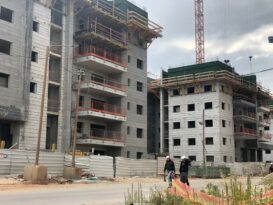In 2020, banks in Israel loaned a whopping total of NIS 78 billion for housing – an increase of 12% from the previous year. At the same time, the level of risk increased, with 40% of borrowers taking out mortgages at a rate of more than 60% of the value of their homes. These figures come from the recent Bank of Israel report summarizing 2020. However, there is good news for borrowers: the average interest rate is still very low, standing at just 2.25%.
2020 was one of the most difficult years in the history of the economy in Israel and the world at large. It was also a record year for the demand for mortgages in Israel, and as a result, the risks borne by borrowers increased. According to an annual report published by the Banking Supervision Department at the Bank of Israel at the end of May, the sharp increase in the demand for mortgages was recorded against the background of the return of the Israeli housing market to a trajectory of rising prices in 2020. Between 2017 to 2019, prices remained relatively stable and even declined slightly.
According to the data, total housing credit increased by about 12% during 2020, compared to an average growth rate of 8.5% per year during 2018 and 2019. About 100,000 mortgage transactions were made over the course of the year, an increase of 4% compared to 2019. In total, apartment buyers borrowed a sum total of NIS 78 billion in bank credit, a record figure that indicates an increase of approximately 16% compared to 2019, which saw the previous record of about NIS 67.7 billion.
The Bank of Israel explained two main factors that contributed to these high figures for the mortgage market in Israel. First, in 2020, there was a rise in the number of first-time homebuyers in general, as well as those who purchased apartments through the Buyer’s Price Program (mechir l’mishtaken), a subsidized housing program initiated by former Finance Minister Moshe Kahlon. Over the course of the year, buyers through this program collectively took out mortgages amounting to approximately NIS 11.5 billion, an increase of roughly 65% compared to 2019.
The Bank of Israel explained that another reason was an increase in the amount of mortgage refinancing under new terms representing a large number of the total number of transactions. During 2020, the rate of refinancing transactions was 7%, compared to an average of 4% in 2018-2019. The sum total of loans taken out in 2020 under renewed terms was roughly NIS 20 billion, an increase of about 70% compared to 2019, while the number of refinancing transactions was around 35,000, an increase of 100% compared to 2019!
Along with a jump in the volume of mortgages taken out this year, the Bank of Israel noted that there has been a deterioration in the risk indices of housing credit portfolios. Approximately 40% of the mortgages taken out in 2020 were considered high-risk loans – at financing rates of between 60-75% of the value of the property. This is an increase from 2019 when 36% of all mortgage loans fell in this category. There was also a six-month increase in the average repayment period, bringing it to 22.5 years.
However, the report on the mortgage market also stated that despite the increase in financing in Israel, the loan repayment rate out of total household income remained stable, averaging at about 26.5%. This figure is a key variable in assessing a borrower’s probability of insolvency.
Despite peak demand, interest rates for the various mortgage routes remained low, contrary to fears that emerged at the beginning of the economic crisis brought about by the COVID-19 pandemic. Due to a sharp rise in risk and volatility in the markets, many experts initially predicted that there would also be an increase in credit value and interest rates. These predictions did not come to fruition, however; interest rates not only did not rise, they actually dropped. As of March 2021, the average interest rate on a housing loan was 2.25%, lower than the 2.41% recorded in February 2020, just before the pandemic hit Israel.







